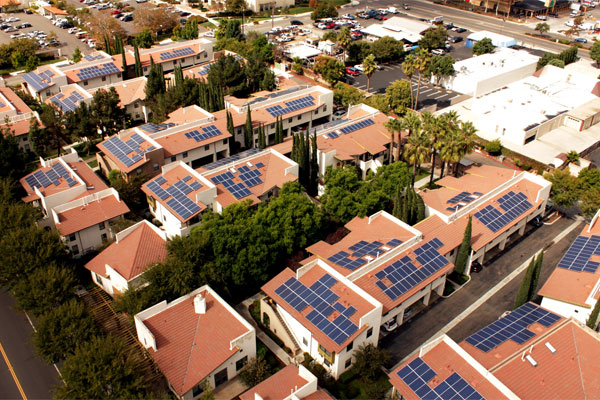The Brief:
- The residential and commercial sectors of the U.S. solar-plus-storage market are witnessing a significant shift towards integrated solutions.
- Leading companies like Tesla, Sunrun, and SunPower dominate residential installations, showcasing the sector’s consolidation.
- In contrast, the commercial market, heavily influenced by state-specific storage incentives, remains focused in regions like New York, Massachusetts, and California.
The Insight:
The integration of storage systems with distributed solar installations is becoming increasingly significant in the United States, highlighting a dynamic shift in the renewable energy sector, according to a report by Wood Mackenzie.
A key indicator of this trend is the growing attachment rate of storage systems to solar installations. In the third quarter of 2023, 11% of residential and 5% of non-residential solar installations in the U.S. were equipped with storage solutions. This trend is largely driven by direct storage incentives, a move away from traditional net metering, opportunities in grid services, and concerns over grid reliability.
To better understand and track these developments, Wood Mackenzie has introduced the U.S. Distributed Solar-Plus-Storage Leaderboard. This tool, updated quarterly, ranks and provides market shares for both solar-plus-storage installers and battery vendors. It is a part of the US Distributed Solar Service and the Energy Storage Service.
In the residential sector, Tesla’s Powerwall and LG’s RESU line have historically dominated the market. From 2018 through the third quarter of 2023, these two brands held 77% of the market.
However, their dominance is being challenged by new entrants, reducing their combined market share to 65% in 2023. Companies such as Enphase, SunPower, Generac, SolarEdge, and FranklinWH have emerged as significant competitors.

The all-electric F-150® Lightning™ has a targeted EPA-estimated range of 300 miles, zero emissions and available Ford Intelligent Backup Power.
For battery vendors, differentiation is key.
Factors such as pricing, warranty terms, rate optimization software, ease of installation, and inverter power levels are critical for competition. Additionally, forging strategic relationships with installers is becoming increasingly important for securing market share.
In terms of solar-plus-storage installation, the market is more consolidated than the broader residential solar market. Tesla, Sunrun, and SunPower together installed over 55% of residential solar-plus-storage systems in the U.S. in 2023. These companies share common traits, such as a long-standing presence in the residential solar market and significant investments in storage technology.
Tesla, for instance, has adopted a strategy where storage is a default option with its solar installations, contributing to its leading position in the market.
Smaller regional installers, like Cinnamon Energy in California and Sun Valley Solar Solutions in Arizona, are also making inroads in the market, focusing specifically on storage solutions. Policy changes, such as California’s Net Billing Tariff, are expected to further influence market dynamics, favoring installers with expertise in storage solutions.
Commercial solar-plus-storage, however, remains concentrated in a few key markets with direct storage incentives, such as New York, Massachusetts, and California. These states accounted for 60% of the non-residential storage-paired solar capacity nationwide since 2018. The commercial sector is currently led by Borrego, Nexamp, and American Renewables Construction, with market shares influenced significantly by their presence in these key states.
Looking forward, the market is expected to see significant fluctuations and opportunities for new entrants, especially as storage policies become more favorable and the demand for solar-plus-storage systems continues to grow.
This evolution signifies a critical phase in the renewable energy sector, highlighting the importance of integrating storage solutions with solar installations for enhanced efficiency and reliability. As the market evolves, the role of innovative technologies and strategic business models will be pivotal in shaping the future of distributed solar-plus-storage systems in the U.S.











Comments